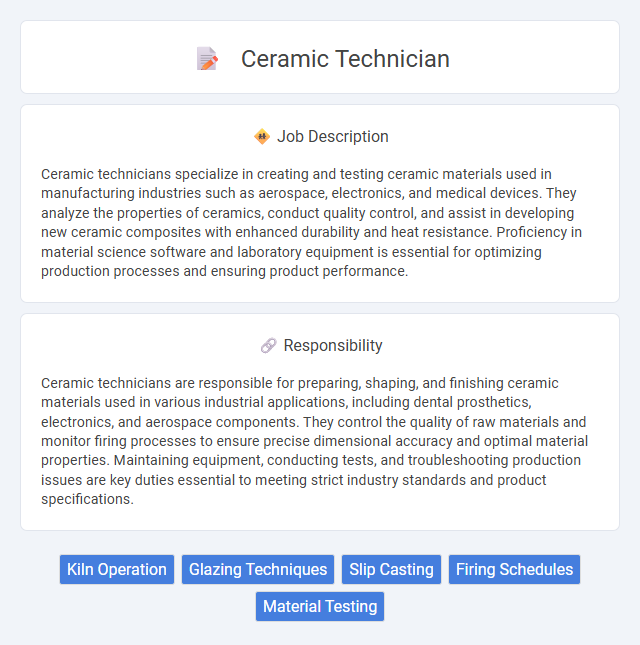
Ceramic technicians specialize in creating and testing ceramic materials used in manufacturing industries such as aerospace, electronics, and medical devices. They analyze the properties of ceramics, conduct quality control, and assist in developing new ceramic composites with enhanced durability and heat resistance. Proficiency in material science software and laboratory equipment is essential for optimizing production processes and ensuring product performance.
Individuals with strong attention to detail and manual dexterity are likely suitable for a ceramic technician role, as the job requires precise manipulation of ceramic materials. Those who prefer repetitive, hands-on tasks and have good patience may find this occupation aligns well with their skills. People with respiratory issues or sensitivities to dust and fine particles might face challenges due to working conditions involving ceramic powders and glazes.
Qualification
Ceramic technicians require specialized qualifications, typically including a diploma or degree in ceramics, materials science, or a related field. Proficiency in computer-aided design (CAD) software and hands-on experience with kiln operation and ceramic testing methods are essential. Strong problem-solving skills and knowledge of material properties enable technicians to produce high-quality ceramic products and ensure durability and performance standards.
Responsibility
Ceramic technicians are responsible for preparing, shaping, and finishing ceramic materials used in various industrial applications, including dental prosthetics, electronics, and aerospace components. They control the quality of raw materials and monitor firing processes to ensure precise dimensional accuracy and optimal material properties. Maintaining equipment, conducting tests, and troubleshooting production issues are key duties essential to meeting strict industry standards and product specifications.
Benefit
Ceramic technician roles likely offer benefits such as hands-on experience with advanced materials and innovative manufacturing processes, enhancing technical skills and career prospects. There is a strong probability of working in diverse industries including aerospace, automotive, and healthcare, providing job stability and growth opportunities. Health and safety standards in these positions may also contribute to a secure and supportive work environment.
Challenge
The role of a ceramic technician often presents challenges related to precision and material properties, as achieving the perfect balance between aesthetics and durability can be complex. It is probable that technicians must troubleshoot issues like cracks or improper firing, requiring deep knowledge of ceramic chemistry and kiln operations. Navigating these difficulties demands both technical skill and problem-solving abilities to ensure high-quality finished products.
Career Advancement
Ceramic technicians gain expertise in materials science and manufacturing processes, positioning themselves for advancement into senior technician, production supervisor, or research and development roles. Mastery of CAD software and knowledge of advanced ceramics improve promotion prospects in industries such as aerospace, automotive, and electronics. Continuous skill development and certifications in quality control or process engineering significantly enhance career growth opportunities.
Key Terms
Kiln Operation
Ceramic technicians specialize in kiln operation, ensuring precise temperature control and firing schedules to achieve optimal ceramic product quality. Mastery of kiln maintenance, safety protocols, and material properties is essential for preventing defects such as warping or cracking during the firing process. Expertise in programmable kiln controllers and thermal analysis contributes to consistent production efficiency and superior ceramic finishes.
Glazing Techniques
Ceramic technicians specializing in glazing techniques expertly apply various glaze formulas to enhance the durability and aesthetic appeal of ceramic products. They use methods such as dipping, spraying, and brushing to achieve uniform coatings and unique surface textures that meet specific design requirements. Mastery of kiln firing temperatures and glaze chemistry is essential to ensure optimal finish quality and prevent defects during the firing process.
Slip Casting
Ceramic technicians specializing in slip casting expertly prepare liquid clay mixtures to pour into molds, enabling the creation of intricate ceramic shapes with consistent quality. They monitor the drying process to ensure optimal porosity and surface finish, while adjusting the slip formulation for properties such as viscosity and particle suspension. Proficiency in mold maintenance, defect identification, and material science principles is essential for producing durable and precise ceramics in industrial or artistic applications.
Firing Schedules
Ceramic technicians meticulously develop and monitor firing schedules to control temperature ramps, soak times, and cooling rates, ensuring optimal material properties and structural integrity. Precise firing schedules are crucial for preventing defects such as warping, cracking, or incomplete sintering in advanced ceramics used in aerospace, electronics, and medical implants. Proficiency in kiln operation and thermocouple data analysis allows ceramic technicians to optimize firing cycles, improving product consistency and performance.
Material Testing
Ceramic technicians specializing in material testing evaluate the physical and chemical properties of ceramic materials to ensure durability, heat resistance, and structural integrity. They utilize advanced spectrometry, microscopy, and thermal analysis techniques to detect flaws and optimize material performance for industrial applications. Proficiency in ASTM standards and ISO protocols is essential for producing reliable test results and supporting quality control in manufacturing processes.
 kuljobs.com
kuljobs.com